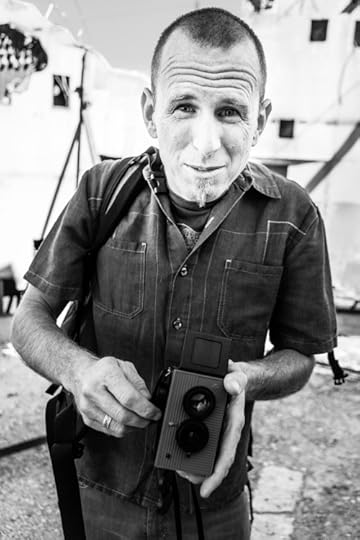On Real Photographers
 My friend, and inspiration, Chris Orwig
My friend, and inspiration, Chris Orwig
My first experiences of being part of a group of my peers did not go well. My memories of being in school are mostly filled with my efforts to fit in, and the efforts of others to keep me out. The new kid. The smaller kid. The kid with the funny name. So I come honestly by my desire to see others included.
So when I hear people complain that “now everyone has a camera and suddenly everyone’s a photographer” I hear the same old, fear-driven, mean-spirited, zeitgeist of the schoolyard.
The same craft, beautiful for it’s democratic nature, that admitted you, and admitted me, will admit others. And with the same tools we picked up with such wonder, those others will make photographs. That’s what cameras do. And it’s what people who own them do. And they will, in that moment, become photographers: makers of photographs.
They are not faux-tographers. They are not necessarily “just camera-owners”. Neither are they DSLR-monkeys, or whatever other pejorative seems clever at the time. Shame on you. Shame on us as an industry.
We’re so fond of definitions and categories. We need them. Without them how would we exclude those who threaten us, threaten our living, or our artistic sensibilities? Have you ever noticed how conveniently those definitions always include us, how the borders defined by the exclusion they map out seem to change in relation to the way we change? We are always in. They are always out. Isn’t it suspiciously convenient that we get to draw the line?
It used to be that being a Photographer-with-a-capital-P meant something. Let’s not kid ourselves, though, it did not mean we created quality work. Mediocrity has plagued us as much as it’s plagued every other craft out there. No, it meant – at a minimum – that we had expensive gear, some experience, and the knowledge to combine those. I’m talking about the professionals here. And we had scarcity on our side. That, my friends, is what has changed. And now we have to compete – those of us that are gluttons enough for punishment that we want to do this for a living – on the same ground that the rest of the world has to compete: value. (Not price. Value.)
Still talking to the pros here: digital did not kill our business. Our failure to respond to shifting market conditions did. Stock did not kill our business, our failure to adapt did. Free did not put us out of work. Our failure to provide value did. And while the photographers I hear complaining about others undercutting them are busy shopping on Amazon (meanwhile, nearby, one bookseller says to another: Amazon is killing my business, it’s not fair!) and between rants about micro-stock killing their business, they’re downloading free digital content and royalty-free stock music for their slideshows in a separate browser window.
Look, I feel your pain. I do. But can we all, please, drop the entitlement? It’s not getting us anywhere. It’s not putting food on the table. It’s taking up air that could be used to engage that creative brain of yours to be as creative with your business and the finding value for your audience, your market, that has nothing to do with the fact that you own a camera and know how to use it. A rising tide floats all the boats. If it doesn’t it’s because your boat has a hole in it. Stop pissing into the water and yelling at the winds and fix your boat. Careen that ship immediately, scrape the barnacles, plug the holes, and get back to sailing as best you can.
The arguments are wearing thin. They’re made from very human places, I know that. Made from the fear that others will surpass us. Made from the fear we’ll be overlooked, or the fear that, if we’re honest with ourselves, we were never as noticed as we’d hoped in the first place. I get that it’s wildly frustrating when someone looks at your work (at my work! The photographs I poured my heart, and 30 years of trial and many errors!) and says, What a good camera you must have.
And we respond. We say no one’s a chef just because they own pots. We say no one’s an author just because they use a typewriter. And we pat ourselves on the back for our cleverness. I’ve done it too. But while it makes us feel better, it’s precious and specist and doesn’t recognize its own glaring lack of humility. Just owning a camera and using it to make photographs doesn’t make you a photographer? Really? What do these new photographers have to do to cross our magic line? Make photographs we like, that match our changing standards? Make photographs for as long, or longer, than we have? Where’s the line? Who gets to decide? My God I hope it’s not us, because too many of us are proving ourselves to be self-protective, petty, exclusionary, and elitist. Lump me in with the faux-tographers, because they just seem to want to make photographs. I bet they’re enjoying the journey.
Being a photographer doesn’t mean you create good art. True. But then neither does having a business card with the word professional.
Our categories are useless. Harmful, even. They separate us. They keep us siloed and cut off from generosity and openness and collaboration. They keep us focused on our own “qualifications” and not on the audiences and markets we should be finding new ways to serve, to inspire, to connect with. Our scarcity mentality is hurting us. It’s stopping us from being creative about making a living. The world owes us nothing, which is hard to accept when we’ve paid for a degree, invested in gear, or bought business cards, only to find out the universe doesn’t give a damn, and cares only about what value we bring.
I am a photographer. I make photographs. I have since I was 14. You may not like them. You may have very particular feelings about whether they are or are not art. But, friends, we can do better than defining for others what they are not. What I wouldn’t give to stop with the further qualifications – professional means nothing. Amateur means nothing (it should). The only thing that means something in this context is your work. That you do your work. That it excites you, that it moves you, that it does what you hope for it, and that – for most of us – it touches a wider audience. Looking at others and putting them into the boxes that make us feel better about our art, or boxes that cast them as the scapegoats for the fact that we’re not succeeding the way we wished we were, won’t get us a hair’s-width closer to better art or better business.
This is an opinion piece. You might not agree with it. The comments might fill with the inevitable “Yeah, but…!” Fine. These subjects can be deeply emotional, and sometimes that comes out in less than graceful ways. My regulars are respectful and kind people. But the nature of the internet is that the rooms are open to all. Comments are open. But this is my blog – my living room – and I set the rules: no respect, no kindness, no comments. I’ll delete your ass if you’re not compassionate and constructive. This post is an argument for inclusion, renewed creativity, and an abundance mentality – if you want to argue against that, check out WordPress.com where you can get your own blog. I’m in the middle of moving house and start travelling soon, so please don’t come to pick a fight – my lack of response will only give you an aneurism. Go make photographs while you wait.



